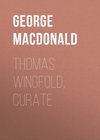Kitabı oku: «Thomas Wingfold, Curate», sayfa 24
VOLUME III
CHAPTER I. AFTER THE SERMON
As the sermon drew to a close, and the mist of his emotion began to disperse, individual faces of his audience again dawned out on the preacher’s ken. Mr. Drew’s head was down. As I have always said, certain things he had been taught in his youth, and had practised in his manhood, certain mean ways counted honest enough in the trade, had become to him, regarded from the ideal point of the divine in merchandize—such a merchandize, namely, as the share the son of man might have taken in buying and selling, had his reputed father been a shop-keeper instead of a carpenter—absolutely hateful, and the memory of them intolerable. Nor did it relieve him much to remind himself of the fact, that he knew not to the full the nature of the advantages he took, for he knew that he had known them such as shrunk from the light, not coming thereto to be made manifest. He was now doing his best to banish them from his business, and yet they were a painful presence to his spirit—so grievous to be borne, that the prospect held out by the preacher of an absolute and final deliverance from them by the indwelling presence of the God of all living men and true merchants, was a blessedness unspeakable. Small was the suspicion in the Abbey Church of Olaston that morning, that the well-known successful man of business was weeping. Who could once have imagined another reason for the laying of that round, good-humoured, contented face down on the book-board, than pure drowsiness from lack of work-day interest! Yet there was a human soul crying out after its birthright. Oh, to be clean as a mountain-river! clean as the air above the clouds, or on the middle seas! as the throbbing aether that fills the gulf betwixt star and star!—nay, as the thought of the Son of Man himself, who, to make all things new and clean, stood up against the old battery of sin-sprung suffering, withstanding and enduring and stilling the recoil of the awful force wherewith his Father had launched the worlds, and given birth to human souls with wills that might become free as his own!
While Wingfold had been speaking in general terms, with the race in his mind’s, and the congregation in his body’s eye, he had yet thought more of one soul, with its one crime and its intolerable burden, than all the rest: Leopold was ever present to him, and while he strove to avoid absorption in a personal interest however justifiable, it was of necessity that the thought of the most burdened sinner he knew should colour the whole of his utterance. At times indeed he felt as if he were speaking to him immediately—and to him only; at others, although then he saw her no more than him, that he was comforting the sister individually, in holding out to her brother the mighty hope of a restored purity. And when once more his mind could receive the messages brought home by his eyes, he saw upon Helen’s face the red sunset of a rapt listening. True it was already fading away, but the eyes had wept, the glow yet hung about cheek and forehead, and the firm mouth had forgotten itself into a tremulous form, which the stillness of absorption had there for the moment fixed.
But even already, although he could not yet read it upon her countenance, a snake had begun to lift its head from the chaotic swamp which runs a creek at least into every soul, the rudimentary desolation, a remnant of the time when the world was without form and void. And the snake said: “Why, then, did he not speak like that to my Leopold? Why did he not comfort him with such a good hope, well-becoming a priest of the gentle Jesus? Or, if he fancied he must speak of confession, why did he not speak of it in plain honest terms, instead of suggesting the idea of it so that the poor boy imagined it came from his own spirit, and must therefore be obeyed as the will of God?”
So said the snake, and by the time Helen had walked home with her aunt, the glow had sunk from her soul, and a gray wintry mist had settled down upon her spirit. And she said to herself that if this last hope in George should fail her, she would not allow the matter to trouble her any farther; she was a free woman, and as Leopold had chosen other counsellors, had thus declared her unworthy of confidence, and, after all that she had suffered and done for love of him, had turned away from her, she would put money in her purse, set out for France or Italy, and leave him to the fate, whatever it might be, which his new advisers and his own obstinacy might bring upon him. Was the innocent bound to share the shame of the guilty? Had she not done enough? Would even her father require more of her than she had already done and endured?
When, therefore, she went into Leopold’s room, and his eyes sought her from the couch, she took no notice that he had got up and dressed while she was at church; and he knew that a cloud had come between them, and that after all she had borne and done for him, he and his sister were now farther apart, for the time at least, than when oceans lay betwixt their birth and their meeting; and he found himself looking back with vague longing even to the terrible old house of Glaston, and the sharing of their agony therein. His eyes followed her as she walked across to the dressing-room, and the tears rose and filled them, but he said nothing. And the sister who, all the time of the sermon, had been filled with wave upon wave of wishing—that Poldie could hear this, could hear that, could have such a thought to comfort him, such a lovely word to drive the horror from his soul, now cast on him a chilly glance, and said never a word of the things to which she had listened with such heavings of the spirit-ocean; for she felt, with an instinct more righteous than her will, that they would but strengthen him in his determination to do whatever the teacher of them might approve. As she repassed him to go to the drawing-room, she did indeed say a word of kindness; but it was in a forced tone, and was only about his dinner! His eyes over-flowed, but he shut his lips so tight that his mouth grew grim with determination, and no more tears came.
To the friend who joined her at the church-door, and, in George Bascombe’s absence, walked with them along Pine Street, Mrs. Ramshorn remarked that the curate was certainly a most dangerous man—particularly for young people to hear—he so confounded all the landmarks of right and wrong, representing the honest man as no better than the thief, and the murderer as no worse than anybody else—teaching people in fact that the best thing they could do was to commit some terrible crime, in order thereby to attain to a better innocence than without it could ever be theirs. How far she mistook, or how far she knew or suspected that she spoke falsely, I will not pretend to know. But although she spoke as she did, there was something, either in the curate or in the sermon, that had quieted her a little, and she was less contemptuous in her condemnation of him than usual.
Happily both for himself and others, the curate was not one of those who cripple the truth and blind their own souls by
some craven scruple
Of thinking too precisely on the event—
A thought which, quartered, hath but one part wisdom,
And ever three parts coward;
and hence, in proportion as he roused the honest, he gave occasion to the dishonest to cavil and condemn. Imagine St. Paul having a prevision of how he would be misunderstood, AND HEEDING IT!—what would then have become of all those his most magnificent outbursts? And would any amount of apostolic carefulness have protected him? I suspect it would only have given rise to more vulgar misunderstandings and misrepresentations still. To explain to him who loves not, is but to give him the more plentiful material for misinterpretation. Let a man have truth in the inward parts, and out of the abundance of his heart let his mouth speak. If then he should have ground to fear honest misunderstanding, let him preach again to enforce the truth for which he is jealous, and if it should seem to any that the two utterances need reconciling, let those who would have them consistent reconcile them for themselves.
The reason of George Bascombe’s absence from church that morning was, that, after an early breakfast, he had mounted Helen’s mare, and set out to call on Mr. Hooker before he should have gone to church. Helen expected him back to dinner, and was anxiously looking for him. So also was Leopold, but the hopes of the two were different.
At length the mare’s hoofs echoed through all Sunday Glaston, and presently George rode up. The groom took his horse in the street, and he came into the drawing-room. Helen hastened to meet him.
“Well, George?” she said, anxiously.
“Oh, it’s all right!—will be at least, I am sure. I will tell you all about it in the garden after dinner.—Aunt has the good sense never to interrupt us there,” he added. “I’ll just run and show myself to Leopold: he must not suspect that I am of your party and playing him false. Not that it is false, you know! for two negatives make a positive, and to fool a mad-man is to give him fair play.”
The words jarred sorely on Helen’s ear.
Bascombe hurried to Leopold, and informed him that he had seen Mr. Hooker, and that all was arranged for taking him over to his place on Tuesday morning, if by that time he should be able for the journey.
“Why not to-morrow?” said Leopold. “I am quite able.”
“Oh! I told him you were not very strong. And he wanted a run after the hounds to-morrow. So we judged it better put off till Tuesday.”
Leopold gave a sigh, and said no more.
CHAPTER II. BASCOMBE AND THE MAGISTRATE
After dinner, the cousins went to the summer-house, and there George gave Helen his report, revealing his plan and hope for Leopold.
“Such fancies must be humoured, you know, Helen. There is nothing to be gained by opposing them,” he said.
Helen looked at him with keen eyes, and he returned the gaze. The confidence betwixt them was not perfect: each was doubtful as to the thought of the other, and neither asked what it was.
“A fine old cock is Mr. Hooker!” said Greorge; “a jolly, good-natured, brick-faced squire; a tory of course, and a sound church-man; as simple as a baby, and took everything I told him without a hint of doubt or objection;—just the sort of man I expected to find him! When I mentioned my name, &c., he found he had known my father, and that gave me a good start. Then I lauded his avenue, and apologized for troubling him so early and on Sunday too, but said it was a pure work of mercy in which I begged his assistance—as a magistrate, I added, lest he should fancy I had come after a subscription. It was a very delicate case, I said, in which were concerned the children of a man of whom he had, I believed, at one time known something—General Lingard. ‘To be sure!’ he cried; ‘knew him very well; a fine fellow—but hasty, sir—hasty in his temper!’ I said I had never known him myself, but one of his children was my cousin; the other was the child of his second wife, a Hindoo lady unfortunately, and it was about him I presumed to trouble him. Then I plunged into the matter at once, telling him that Leopold had had violent brain-fever, brought on by a horrible drug, the use of which, if use I dare call it, he had learnt in India; and that, although he had recovered from the fever, it was very doubtful if ever he would recover from the consequences of it, for that he had become the prey of a fixed idea, the hard deposit from a heated imagination. ‘And pray what is the idea?’ he asked. ‘Neither more nor less,’ I answered, ‘than that he is a murderer!’—‘God bless me!’ he cried, somewhat to my alarm, for I had been making all this preamble to prejudice the old gentleman in the right direction, lest afterwards Leopold’s plausibility might be too much for him. So I echoed the spirit of his exclamation, declaring it was one of the saddest things I had ever known, that a fellow of such sweet and gentle nature, one utterly incapable of unkindness, not to say violence, should be so possessed by misery and remorse for a phantom-deed, no more his than if he had dreamed it, a thing he not only did not do, but never could have done. I had not yet however told him, I said, what was perhaps the saddest point in the whole sad story—namely, that the attack had been brought on by the news of the actual murder of a lady to whom he had been passionately attached; the horror of it had unhinged his reason, then turned and fastened upon his imagination; so that he was now convinced beyond the reach of argument or even the clearest proof, that it was his own hand that drove the knife to her heart. Then I recalled to his memory the case as reported, adding that the fact of the murderer’s prolonged evasion of justice, appeared, by some curious legerdemain of his excited fancy, if not to have suggested—of that I was doubtful—yet to have ripened his conviction of guilt. Now nothing would serve him but he must give himself up, confess—no, that was not a true word in his case!—accuse himself of the crime, and meet his fate on the gallows,—‘in the hope, observe, my dear sir,’ I said, ‘of finding her in the other world, and there making it up with her!’—‘God bless me!’ he cried again, in a tone of absolute horror. And every now and then, while I spoke, he would ejaculate something; and still as he listened his eyes grew more and more bloodshot with interest and compassion. ‘Ah, I see!’ he said then; ‘you want to send him to a madhouse?—Don’t do it,’ he continued, in a tone of expostulation, almost entreaty. ‘Poor boy! He may get over it. Let his friends look to him. He has a sister, you say?’ I quickly reassured him, telling him such was no one’s desire, and saying I would come to the point in a moment, only there was one thing more which had interested me greatly, as revealing how a brain in such a condition will befool itself, all but generating two individualities.—There I am afraid I put my foot in it, but he was far too simple to see it was cloven—ha! ha! and I hastened to remark that, as a magistrate, he must have numberless opportunities of noting similar phenomena. He waved his hand in deprecation, and I hastened to remark that, up to a certain point, whatever hint the newspapers had given, Leopold had expanded and connected with every other, but that at one part of the story I had found him entirely at fault: he could not tell what he did, where he went, or how he had felt, first after the deed was done. He confessed all after that was a blank until he found himself in bed. But when I told him something he had not seen—which his worship might remember—the testimony namely of the coast-guardsmen—about the fishing-boat with the two men in it—I had here to refresh his memory as to the whole of that circumstance—and did so by handing him the newspaper containing it—that was what I made you give me the paper for—I have lost the thread of my sentence, but never mind. I told him then something I have not told you yet, Helen, namely, that when I happened to allude to that portion of the story, Leopold started up with flashing eyes, and exclaimed, ‘Now I remember! It all comes back to me as clear as day. I remember running down the hill, and jumping into the boat just as they shoved off. I was exhausted, and fell down in the stern. When I came to myself, the two men were forward: I saw their legs beneath the sails. I thought they would be sure to give me up, and at once I slipped overboard. The water revived me, but when I reached the shore, I fell down again, and lay there I don’t know how long. Indeed I don’t remember anything more except very confusedly.’ That is what Leopold said, and what I now told Mr. Hooker. Then at last I opened my mind to him as to wherein I ventured to ask his assistance; and my petition was, that he would allow me to bring Leopold, and would let him go through the form of giving himself up to justice. Especially I begged that he would listen to all he had to say, and give no sign that he doubted his story. ‘And then, sir,’ I concluded, ‘I would leave it to you to do what we cannot—reconcile him to going home instead of to prison.’
“He sat with his head on his hand for a while, as if pondering some weighty question of law. Then he said suddenly: ‘It is now almost church-time. I will think the matter over. You may rely upon me. Will you take a seat in my pew and dine with us after?’ I excused myself on the ground that I must return at once to poor Leopold, who was anxiously looking for me. And you must forgive me, Helen, and not fancy me misusing Fanny, if I did yield to the temptation of a little longer ride. I have scarcely more than walked her, with a canter now and then when we had the chance of a bit of turf.”
Helen assured him with grateful eyes that she knew Fanny was as safe with him as with herself; and she felt such a gush of gratitude follow the revival of hope, that she was nearer being in love with her cousin to ever before. Her gratitude inwardly delighted George, and he thought the light in her blue eyes lovelier than ever; but although strongly tempted, he judged it better to delay a formal confession until circumstances should be more comfortable.
CHAPTER III. THE CONFESSION
All that and the following day Leopold was in spirits for him wonderful. On Monday night there came a considerable reaction; he was dejected, worn, and weary. Twelve o’clock the next day was the hour appointed for their visit to Mr. Hooker, and at eleven he was dressed and ready—restless, agitated, and very pale, but not a whit less determined than at first. A drive was the pretext for borrowing Mrs. Ramshorn’s carriage.
“Why is Mr. Wingfold not coming?” asked Lingard, anxiously, when it began to move.
“I fancy we shall be quite as comfortable without him, Poldie,” said Helen. “Did you expect him?”
“He promised to go with me. But he hasn’t called since the time was fixed.”—Here Helen looked out of the window.—“I can’t think why it is. I can do my duty without him though,” continued Leopold, “and perhaps it is just as well.—Do you know, George, since I made up my mind, I have seen her but once, and that was last night, and only in a dream.”
“A state of irresolution is one peculiarly open to unhealthy impressions,” said George, good-naturedly disposing of his long legs so that they should be out of the way.
Leopold turned from him to his sister.
“The strange thing, Helen,” he said, “was that I did not feel the least afraid of her, or even abashed before her. ‘I see you,’ I said. ‘Be at peace. I am coming; and you shall do to me what you will.’ And then—what do you think?—O my God! she smiled one of her own old smiles, only sad too, very sad, and vanished. I woke, and she seemed only to have just left the room, for there was a stir in the darkness.—Do you believe in ghosts, George?”
Leopold was not one of George’s initiated, I need hardly say.
“No,” answered Bascombe.
“I don’t wonder. I can’t blame you, for neither did I once. But just wait till you have made one, George!”
“God forbid!” exclaimed Bascombe, a second time forgetting himself.
“Amen!” said Leopold: “for after that there’s no help but be one yourself, you know.”
“If he would only talk like that to old Hooker!” thought George. “It would go a long way to forestall any possible misconception of the case.”
“I can’t think why Mr. Wingfold did not come yesterday,” resumed Leopold. “I made sure he would.”
“Now, Poldie, you mustn’t talk,” said Helen, “or you’ll be exhausted before we get to Mr. Hooker’s.”
“She did not wish the non-appearance of the curate on Monday to be closely inquired into. His company at the magistrate’s was by all possible means to be avoided. George had easily persuaded Helen, more easily than he expected, to wait their return in the carriage, and the two men were shown into the library, where the magistrate presently joined them. He would have shaken hands with Leopold as well as George, but the conscious felon drew back.
“No, sir; excuse me,” he said. “Hear what I have to tell you first; and if after that you will shake hands with me, it will be a kindness indeed. But you will not! you will not!”
Worthy Mr. Hooker was overwhelmed with pity at sight of the worn sallow face with the great eyes, in which he found every appearance confirmatory of the tale wherewith Bascombe had filled and prejudiced every fibre of his judgment. He listened in the kindest way while the poor boy forced the words of his confession from his throat. But Leopold never dreamed of attributing his emotion to any other cause than compassion for one who had been betrayed into such a crime. It was against his will, for he seemed now bent, even to unreason, on fighting every weakness, that he was prevailed upon to take a little wine. Having ended, he sat silent, in the posture of one whose wrists are already clasped by the double bracelet of steel.
Now Mr. Hooker had thought the thing out in church on the Sunday; and after a hard run at the tail of a strong fox over a rough country on the Monday, and a good sleep well into the morning of the Tuesday, could see no better way. His device was simple enough.
“My dear young gentleman,” he said, “I am very sorry for you, but I must do my duty.”
“That, sir, is what I came to you for,” answered Leopold, humbly.
“Then you must consider yourself my prisoner. The moment you, are gone, I shall make notes of your deposition, and proceed to arrange for the necessary formalities. As a mere matter of form, I shall take your own bail in a thousand pounds to surrender when called upon.”
“But I am not of age, and haven’t got a thousand pounds,” said Leopold.
“Perhaps Mr. Hooker will accept my recognizance in the amount?” said Bascombe.
“Certainly,” answered Mr. Hooker, and wrote something, which Bascombe signed.
“You are very good, George,” said Leopold. “But you know I can’t run away if I would,” he added with a pitiful attempt at a smile.
“I hope you will soon be better,” said the magistrate kindly.
“Why such a wish, sir?” returned Leopold, almost reproachfully, and the good man stood abashed before him.
He thought of it afterwards, and was puzzled to know how it was.
“You must hold yourself in readiness,” he said, recovering himself with an effort, “to give yourself up at any moment. And, remember, I shall call upon you when I please, every week, perhaps, or oftener, to see that you are safe. Your aunt is an old friend of mine, and there will be no need of explanations. This turns out to be no common case, and after hearing the whole, I do not hesitate to offer you my hand.”
Leopold was overcome by his kindness, and withdrew speechless, but greatly relieved.
Several times during the course of his narrative, its apparent truthfulness and its circumstantiality went nigh to stagger Mr. Hooker; but a glance at Bascombe’s face, with its half-amused smile, instantly set him right again, and he thought with dismay how near he had been to letting himself be fooled by a madman.
Again in the carriage, Leopold laid his head on Helen’s shoulder, and looked up in her face with such a smile as she had never seen on his before. Certainly there was something in confession—if only enthusiasts like Mr. Wingfold would not spoil all by pushing things to extremes and turning good into bad!
Leopold was yet such a child, had so little occupied himself with things about him, and had been so entirely taken up with his passion, and the poetry of existence unlawfully forced, that if his knowledge of the circumstances of Emmeline’s murder had depended on the newspapers, he would have remained in utter ignorance concerning them. From the same causes he was so entirely unacquainted with the modes of criminal procedure, that the conduct of the magistrate never struck him as strange, not to say illegal. And so strongly did he feel the good man’s kindness and sympathy, that his comfort from making a clean breast of it was even greater than he expected. Before they reached home he was fast asleep. When laid on his couch, he almost fell asleep again, and Helen saw him smile as he slept.




















